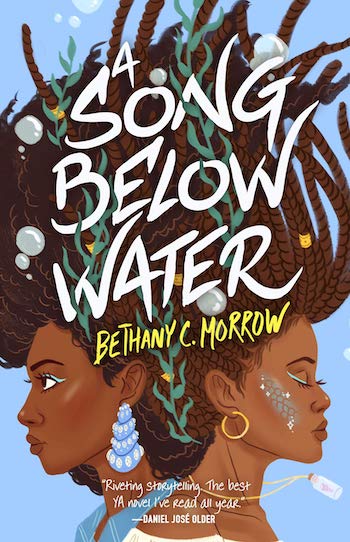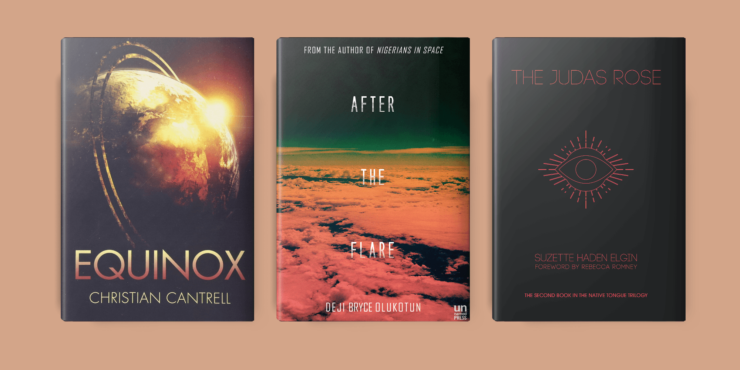Hear me out.
We all remember that scene in The Neverending Story—which is a ridiculously apropos title for this conversation, by the way—where Bastian takes out his sandwich and, while hiding in the school attic, reading his stolen tome, stops himself after one bite, saying, “No. Not too much. We’ve still got a long way to go.”
That’s my reading life, in a nutshell. While I can count on one hand the times I have thrown restraint to the wind and finished an amazing book in one or two sittings, it is more often that I’ve started reading something, appreciated it, and taken months to finish. Better still are the times I’ve started a book, realized I love it on a deep bone level, and, lamenting the progress I am making toward completing it, set it down.
Because I love it too much.
This is a thing that happens.
It isn’t that I’ve never DNF’d a book—and to save you the trouble of smugly pronouncing your illiteracy in the comment section, DNF is (probably) Goodreads lingo for “did not finish.” That’s just not what’s happening here. I haven’t abandoned the book. I have decided to savor to the point of stalling to the point of stopping. I want to stay inside the book, even if that means walking away from it for literal years at a time.
Equinox by Christian Cantrell, is a sequel. Its predecessor, Containment, was so utterly my cup of tea. There is a kind of science fiction that is sterile in the best possible way, and Containment, the story of brilliant but detached young people coming of age on a Venus colony that has to be self-sufficient because there is little to no hope of salvation coming from Earth, and no prospect of the colony using their precious and impressive brain power to bridge the distance between them. There’s a lot of terraforming, as one would expect, and a small population, and a love story that doesn’t resemble love in the time of plentiful humans and preferences and not needing to procreate for the good of your kind. I adored it. In that case, it was meant to be a buddy read but my buddy was not getting to the book—no judgment, as probably goes without saying given the premise of this essay—and I could not wait. If I read it in a month, that’s basically my equivalent of speed-reading. When I gushed about it to the author—and honestly, who even remembers how you become mutuals with people anymore, but we were—he was kind enough to send me a signed copy of Equinox.
I probably shouldn’t have told you that bit. That feels like it makes it worse.
I have been reading Equinox for more than a couple of years. I have reread the first forty pages in that time, realizing it’s still vibrant and current in my mind, and then, satisfied, have set it back down every time. It’s completely different to Containment in tone. It’s taking place on earth, for one thing, with multiple character perspectives, as opposed to the solitary, quietly defiant and intellectually adventurous MC of the first book. The world of Equinox is loud and colorful, and I’m anxious to find out the connection between where Containment ended and where Equinox begins.
So you can understand why I refuse to read it.
I sped through the first half of Deji Bryce Olukotun’s After the Flare. As with Equinox, After The Flare is a sequel, only I didn’t read book one. If ever there’s a series and I find out you don’t have to read them in publication order, you better believe I am going to test that. Following Nigerians In Space, the first book in the duology, After The Flare picks up with a lone astronaut being necessarily left behind at the International Space Station. Following a catastrophic solar flare, as one might’ve guessed by the title, the world is in total disarray. Amid electricity grids going down and cyberattacks being rampant, there’s one functioning space program, located in Nigeria, and a Nigerian-American former NASA employee is one of few allowed entry into the country to coordinate a rescue mission. Immediately there’s more at play, including the Boko Haram, and something that’s not human.
I bought small post-its because I couldn’t stop writing in the margins. I had to annotate, marking thought-provoking segments of the narrative involving an exploration of Black Americans in the African imagination and Africa in the Black American imagination, or the karmic retribution of the necessarily strict immigration policies in the new world of the novel, or the suddenly spare and lyrical prose surrounding an indigenous woman and her magic.
Reader, I love it. It is like nothing I have ever read. In so much as I have read it.
Finally, I adore The Judas Rose, and maybe the true thesis of this essay is that I don’t finish sequels. Suzette Haden Elgin’s Native Tongue trilogy was brought back into print by Feminist Press, and I read Native Tongue before discussing the work on a panel. I’m not a foodie, but when I am fed by a good book, I can only describe it as nourishing. Native Tongue has a delightful retro-futuristic world, in which it sounds like you’re in the throes of the space race, but it’s actually set in the future and there’s expansive space colonization and extensive alien interaction and negotiation. Which necessitates a focus on linguistics and makes the tiny minority of society known as the Lingoes—a very insulated multi-branch family with a very strict genealogy that breeds for preternatural linguistic intelligence—very important. It’s also a world in which women have been “relieved” of society’s unfair demands on them, accomplished through the repealing of the 19th amendment and stripping them of their civil rights.
Reading it was an almost entirely satisfying experience. It was awe-inspiring in the way only a newly discovered predecessor can be. It’s not exactly like reading Yevgeny Zamyatin’s We after hearing 1984 praised all of one’s life, because there isn’t the resulting rage that plagiarism incites, but I will say that reading Native Tongue was like reading something from The Handmaid’s Tale’s bibliography. It felt essential to science fiction in a way that makes its going out-of-print almost suspicious. I couldn’t help but see the genesis of things credited to later, male authors of the genre in Elgin’s work. I also couldn’t help pointing out that while the panel was rightly gathered to discuss the formative and groundbreaking genius of Elgin’s work, which is not only in the linguistic brilliance, but in the caliber of her storytelling and prose, women of color were entirely missing from a story of women and a language of their own.
Buy the Book


A Song Below Water
The point is, I opened The Judas Rose, the second in the series, and fell headlong into Elgin’s language all over again. And then, like Bastian, I stopped. I pulled myself together, and told myself to be patient, and I haven’t opened it since.
You likely have the same questions my beloved editor for this article did. Bethany, why? What’s the matter with you? Do you even like books? Are you a chaos demon? And the answer is: this is just what I do. If I love a book too much, sometimes—not always, but sometimes—I don’t finish it. I just…walk away.
The wonderful part of this, of course, is that books do not expire. I’ve said it many times, though to be fair, every instance was in defense of buying more books when I have countless books I’ve yet to read at home. But that doesn’t make it any less true. As an author myself, I’m being very honest when I say that I think books can and do serve many more purposes than containing and conveying a story. Or if they don’t, they at least don’t convey that story the same way to every reader, or at each subsequent consumption.
Or whatever, this is a really long way of saying, there are books I do not want to end, and I’m okay with the perhaps surprising lengths I will go to to keep that from happening.
Just please. No spoilers.
Bethany is a recovering expat splitting her time between Montreal, Quebec, and upstate New York—yet another foreign place. A California native, Bethany graduated from the University of California, Santa Cruz with a BA in Sociology (but took notable detours in the Film and Theatre departments). Following undergrad, she studied Clinical Psychological Research at the University of Wales, Bangor, in Great Britain before returning to North America to focus on her literary work. Her YA novel A Song Below Water publishes in June 2020 with Tor Teen.










